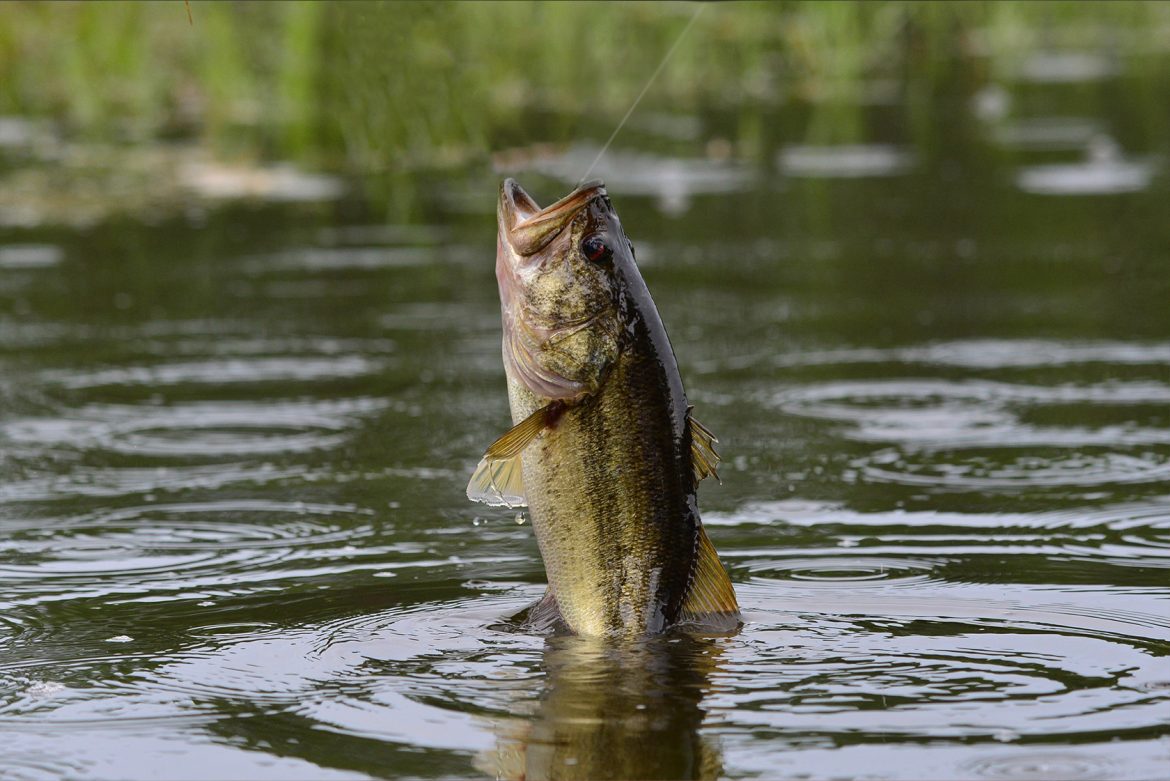Ever wondered why bass become airborne when hooked? Discover the fascinating reasons behind their impressive leaps and reel in expert tips to keep them in the water! Ready to unravel the mystery? Dive into the article now!
Why do Largemouth Bass Jump?
Bass, the beloved sportfish sought after by anglers worldwide, often exhibit the thrilling behavior of jumping during the reeling process. This captivating display of acrobatics can leave anglers in awe and at times frustrated. So, why do largemouth bass jump? Let’s dive into the reasons behind a bass’s “air time”.
Quick Answer
Bass jump when hooked as a natural defense mechanism. By jumping and violently shaking their heads, they try to dislodge the hook and regain their freedom. This behavior allows them to create slack in the line, making it easier to shake off the hook.
Jumping Bass: When Fish Take Flight
When reeling in bass, their instinctual behavior may lead them to jump out of the water. Bass often jump to try and shake off the hook or escape from the perceived threat. Factors like adrenaline, fight-or-flight response, and their powerful swimming abilities contribute to their impressive aerial displays.
Hooked and Hopping: The Defense Mechanism of Bass
Bass jump as a natural defense mechanism to escape perceived threats or unwanted confinement. When hooked, the bass senses the tension in the line and the pressure exerted by the angler.
Instinctively, it interprets these sensations as a potential danger, triggering a fight-or-flight response. In an effort to evade capture, the bass leverages its remarkable muscular strength and explosive power to launch itself out of the water, attempting to dislodge the hook and regain its freedom.
Shaking Things Up: How Bass Use Headshakes to Their Advantage
During a jump, bass vigorously shake their heads, adding another layer of complexity to their escape tactics. By violently shaking their heads from side to side, they aim to loosen or dislodge the hook. This vigorous movement creates slack in the line, which the bass can exploit to its advantage. The decrease in tension allows the fish to thrash and twist its body, attempting to shake off the hook and increase the likelihood of escape.
How to Keep Hooked Bass From Jumping
Want to learn how to keep a hooked bass from jumping? Click now and learn how to keep bass grounded!
Beyond the Hook: Other Reasons for Bass to Take Flight
Bass may also jump due to various factors besides being hooked.
- Low Oxygen Levels: When oxygen levels in the water decrease, bass may leap to access oxygen-rich areas.
- Escape Predators: Bass may jump to escape larger predators that are pursuing them.
- Territorial Displays: Jumping can serve as a territorial display to assert dominance and defend their territory. Find out if bass are territorial in our new blog post. Click the link and reel in some more knowledge!
- Aggressive Strikes: Bass might jump when aggressively striking at prey near the surface of the water.
- Disorient Prey: By leaping, bass create confusion and disorientation among their prey, making it easier to catch them.
- Fight or Flight Response: Jumping is part of the bass’s instinctual fight or flight response when faced with danger.
Did You Know? 3 fun Facts about Bass
- Largemouth bass can reach impressive sizes, with some specimens exceeding 20 pounds.
- These intelligent fish have excellent vision and can spot prey even in low-light conditions. If you want to find out more about bass vision, check out our fascinating articles “Can Bass See At Night” and “What Colors Can Bass See“. Have fun!
- Largemouth bass have a remarkable ability to camouflage themselves, blending in with their surroundings to ambush unsuspecting prey.
Summary
In conclusion, when bass are hooked, their instinctual response is to jump and try to shake off the hook. This is their way of defending themselves and escaping. Their powerful swimming abilities and head-shaking movements add to their efforts to break free.
By learning about these behaviors and using the tips shared in this article, anglers can improve their chances of keeping hooked bass from escaping. So, dive into the exciting world of bass fishing, apply these techniques, and enjoy more successful fishing adventures. Keep those bass grounded and reel in those big catches!
Remember, when engaging in fishing activities, always follow local regulations and practice responsible catch and release techniques to ensure the conservation of these magnificent creatures.
Have fun, tight lines and enjoy the great outdoors!
Amazing Links
- Ready to discover the surprising world of largemouth bass? Check out our article on “50 fun and shocking facts about largemouth bass” and get hooked! Link: 50 Fun Facts About Bass
- Curious if bass can communicate? Unlock the secrets of bass communication in our amazing blog article and click the link to uncover the answer!
- Do you know what largemouth bass eat? Our article “What do Bass eat?” has all the answers and might just surprise you. Link: What Do Largemouth Bass Eat
Catch us on Instagram
Get stunning photos, expert tips, and engaging stories that will take your fishing game to the next level. Don’t miss out and follow us on Instagram today!


1 Comment
Pingback: Ultimate Guide to Largemouth Bass Fishing: Tips, Techniques, and Best Practices - B8LAB Fishing Blog